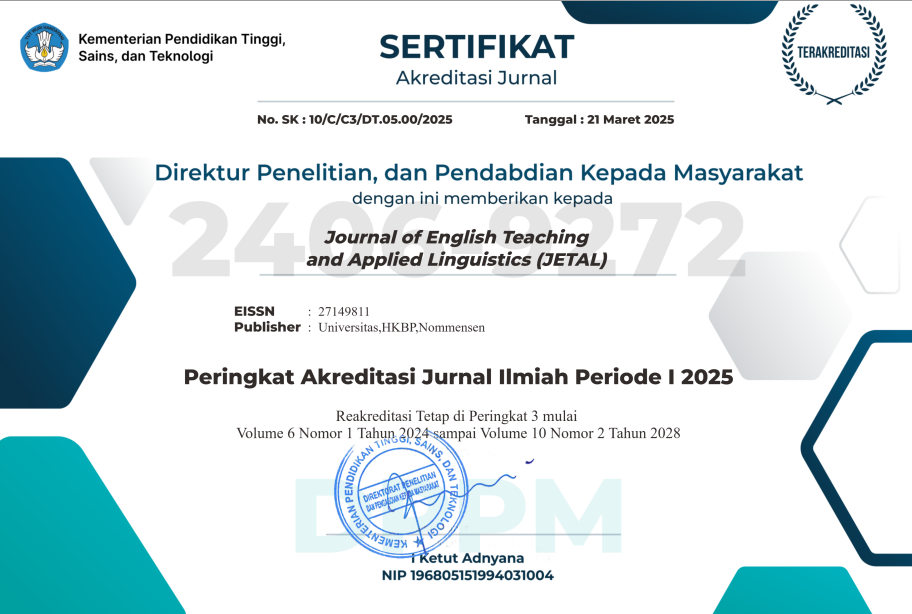The Chaos: Improving the Pronunciation of Grade 9 Students
Abstract
Pronunciation is taught primarily at the elementary level. It is a skill that students should master throughout their studies so that they can express their opinions clearly. This study aimed to identify Grade 9 students’ mispronounced words and their causes, level of pronunciation, and the exposure of students in pronunciation using the poem titled The Chaos written by Gerard Nolst Trenité. The researchers used a purposive sampling technique by acceptable pronunciation standards to select the respondents who are in level 1 from Grade 9 students in a selected private school in San Jose del Monte, Bulacan. This study utilized Patole’s English Pronunciation Problems to classify the mispronounced words followed by a focus group discussion. The results showed that irregular pronunciation was the most common pronunciation problem encountered by the students. Additionally, two respondents stepped on level 2 and one respondent stepped on level 3 wherein the respondents agreed that companions are a great help for them to pronounce the words because they can correct it right away.
References
Alvarez, M. (2023). The Importance of Teaching Pronunciation from the Very First Lesson. https://www.linkedin.com/pulse/importance-teaching-pronunciation-from-very-first-moreno-%C3%A1lvarez
Andini, P. & Zaitun. (2020). The Effectiveness of Learning Pronunciation Through English Content by English With Lucy on Youtube. https://ejournal.my.id/jsgp/article/download/1542/1645
Berkeley University of California. (2024). How Social Learning Theory Works. https://hr.berkeley.edu/how-social-learning-theory-works#:~:text=Albert%20Bandura's%20social%20learning%20theory,direct%20experience%20with%20the%20environment.
Burns, A. (2019). Concepts for Teaching Speaking in the English Language Classroom. Journal: Language Education and Acquisition Research Network, 12(1), 1–11. https://files.eric.ed.gov/fulltext/EJ1225673.pdf?fbclid=IwAR0NTOr79UEzwlXqVEO1LowO8wXliL0AnPYN9GxROKox3-wwvCMYJOFGbi0
Cole et al. (2022). Haemorrhaging: why some words are so easy to mispronounce (and why that could be a good thing). https://theconversation.com/haemorrhaging-why-some-words-are-so-easy-to-mispronounce-and-why-that-could-be-a-good-thing-175746
Education, E. (2021). Pronunciation-Problems faced and why?. https://engeareducation.com/blog/pronun ciation-problems-faced-and-why/
Foulkes, E. (2024). The Complete Guide to Improving your English Pronunciation. https://blog.tjtaylor.net/improve-your-pronunciation/#:~:text=There%20are%203%20main%20aspects,put%20them%20together%20in%20sentences
Katawazai, R. & Haidari, M. (2019). An Evaluation of Sub-Skills (Vocabulary, Grammar and Pronunciation) in Grade 9 textbook. https://www.researchgate.net/publication/336126699_An_Evaluation_of_Sub-Skills_Vocabulary_Grammar_and_Pronunciation_in_Grade_9_textbook
Madzo, D. (2019). Teachers’ Attitudes Towards Teaching English Pronunciation. https://www.diva-portal.org/smash/get/diva2:1523994/FULLTEXT02.pdf
Mart, C. (2021). The Seamless Relationship between Teaching Poetry and Language Learning. Universal Journal of Educational Research, 9(2), 288-291. DOI: 10.13189/ujer.2021.090204.
Megariani, Y. et al. (2020). Mispronunciations in Graduate Students’ Presentation Projects. https://www.researchgate.net/publication/340863699_Mispronunciations_in_Graduate_Students'_Presentation_Projects
Nguyen et al. (2021). Teachers’ and Learners’ Beliefs About Pronunciation Instruction in Tertiary English as a Foreign Language Education. Frontiers, 12. https://doi.org/10.3389/fpsyg.2021.739842
OpenLearn. (2024). Teaching Spanish Pronunciation. https://www.open.edu/openlearn/ocw/mod/oucontent view.php?id=105249§ion=2.1
Oxford University Press. (2022). English Pronunciation for a Global World: An Introduction.https://teachingenglishwithoxford.oup.com/2022/03/09/english-pronunciation-introduction/amp/
Patole, P. (2024). Common Pronunciation Problems in English. https://www.sevenmentor.com/common pronunciation-problems-in english#:~:text=Common%20pronunciation%20mistakes%20people%20make,diphthongs%20or%20long%20vowel%20sounds
PlanetSpark. (2020). 7 ways to deal with Mispronunciation in Children. https://www.planetspark.in/blogs/7-ways-to-deal-with-mispronunciation-in-children
Putri, S. (2020). An Analysis of Students’ Phonological Errors in Pronouncing Lexical Items at Senior High School 12 Pekanbaru. https://repository.uin-suska.ac.id/31000/1/FULL%20KECUALI%20CHAPTER%20%20IV.pdf?fbclid=IwZXh0bgNhZW0CMTAAAR1edk6SwzN5RbzGaBU4UWdEbIRv3lLdoiy0D_Q9TnCfUMatnFZDQ59a9MI_aem_AUJ20i_WuvSqkQSdjkQi6h8eGEabyee3J4GBtc-40uDpJwDOJMtYqY3X-w30SciupO-opd5-gSSOPjdYlPgebW9N
Setter, J. (2021). Mispronunciation: why you should stop correcting people’s mistakes. https://theconversation.com/mispronunciation-why-you-should-stop-correcting-peoples-mistakes-163308
Smowltech. (2023). Social learning theory: what it is, origin and applications. https://smowl.net/en/blog/social-learning theory/#:~:text=facilitator%20of%20evolution.,The%20origins%20of%20social%20learning%20theory%3A%20Albert%20Bandura,Conceptual%20understanding
Susanti, A., & Rika, P. (2023). Phonological Aspect on First Language Acquisition. Journal of English Language Teaching, Literatures & Applied Linguistics (JELTLAL), 1(2), 62–69.
Toci, A. (2020). Problems with Pronunciation among Students of English Language and Literature-SEEU. https://www.researchgate.net/publication/351399903_Problems_with_Pronunciation_Among_Students_of_English_Language_and_Literature-Seeu
Trenité, G. N. (2012). The Chaos of English Pronunciation. https://www.researchgate.net/publicati on/355788555_Common_Pronunciat

This work is licensed under a Creative Commons Attribution-ShareAlike 4.0 International License.
Authors retain copyright and grant the journal right of first publication with the work simultaneously licensed under a Creative Commons Attribution-ShareAlike 4.0 International License (CC BY-SA 4.0) that allows others to share the work with an acknowledgment of the work's authorship and initial publication in this journal.
Authors are able to enter into separate, additional contractual arrangements for the non-exclusive distribution of the journal's published version of the work (e.g., post it to an institutional repository or publish it in a book), with an acknowledgment of its initial publication in this journal.
Authors are permitted and encouraged to post their work online (e.g., in institutional repositories or on their website) prior to and during the submission process, as it can lead to productive exchanges, as well as earlier and greater citation of published work (See The Effect of Open Access).






